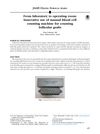3 citations,
August 2022 in “International Journal of Molecular Sciences” COVID-19 can cause hair loss, and treatments like PRP and stem cells might help.
 3 citations,
April 2022 in “Clinical, Cosmetic and Investigational Dermatology”
3 citations,
April 2022 in “Clinical, Cosmetic and Investigational Dermatology” Different methods, including stress management, healthy diet, supplements, and treatments like minoxidil, can help hair grow back after COVID-19 related hair loss.
 3 citations,
October 2021 in “Brain Sciences”
3 citations,
October 2021 in “Brain Sciences” Long-term use of Risperidone may be linked to a serious skin condition in bipolar patients, affecting their overall well-being.
 1 citations,
July 2023 in “Communications biology”
1 citations,
July 2023 in “Communications biology” Removing Mediator 1 from certain mouse cells causes teeth to grow hair instead of enamel.
 1 citations,
May 2023 in “European Journal of Human Genetics”
1 citations,
May 2023 in “European Journal of Human Genetics” Rare ULBP3 gene changes may raise the risk of Alopecia areata, a certain FAS gene deletion could cause a dysfunctional protein in an immune disorder, and having one copy of a specific genetic deletion is okay, but two copies cause sickle cell disease.
1 citations,
January 2023 in “International journal of molecular sciences” Rabbits with Sarcoptes scabiei had thicker skin, cell death, and skin hardening.
 1 citations,
January 2023 in “Aesthetic surgery journal”
1 citations,
January 2023 in “Aesthetic surgery journal” Facial plastic surgeries and aesthetic procedures are becoming more popular in India, with a preference for non-surgical options and effective treatments for facial enhancement and hair loss.
1 citations,
March 2022 in “IntechOpen eBooks” Aging reduces skin stem cell function, leading to changes like hair loss and slower wound healing.
 August 2024 in “International Journal of Medicine”
August 2024 in “International Journal of Medicine” COVID-19 can cause hair loss, and managing it involves counseling, diet changes, and treatments.
 April 2024 in “Communications biology”
April 2024 in “Communications biology” Enzymes involved in Vitamin A metabolism affect hair growth and type in mice.
 April 2024 in “Pharmacoepidemiology and drug safety (Print)”
April 2024 in “Pharmacoepidemiology and drug safety (Print)” The algorithm accurately identified alopecia in women of childbearing age using claims data.
 January 2024 in “Journal of Material Cycles and Waste Management”
January 2024 in “Journal of Material Cycles and Waste Management” Adding human hair to cement can make it tougher and better insulated but also more porous.
 December 2023 in “The journal of physical chemistry. B (1997 : Online)”
December 2023 in “The journal of physical chemistry. B (1997 : Online)” Human hair keratin might be good for filtering out harmful substances from water.
 November 2023 in “BMC women's health”
November 2023 in “BMC women's health” Older age and specific haircare practices increase the risk of traction alopecia, and education on these factors could help prevent it.
 November 2023 in “Plastic and Reconstructive Surgery – Global Open”
November 2023 in “Plastic and Reconstructive Surgery – Global Open” Americans see hair transplants as valuable for treating hair loss and want them to be more affordable and tailored to each gender.

Women with female pattern hair loss tend to have lower self-esteem and body image concerns, but higher self-esteem is linked to more self-compassion.
 July 2023 in “Zenodo (CERN European Organization for Nuclear Research)”
July 2023 in “Zenodo (CERN European Organization for Nuclear Research)” COVID-19 can cause temporary hair loss in some patients, affecting their quality of life.
 January 2023 in “International Journal of Dermatology and Venereology”
January 2023 in “International Journal of Dermatology and Venereology” Many people experienced hair loss after having COVID-19, with the worst cases in hospitalized patients, and some saw hair regrowth within six months.
 June 2022 in “Plastic and Reconstructive Surgery – Global Open”
June 2022 in “Plastic and Reconstructive Surgery – Global Open” Stem cell serum effectively treated hair loss caused by COVID-19.
 March 2022 in “Women's health issues”
March 2022 in “Women's health issues” The conclusion is that women are heavily affected by autoimmune skin diseases, face significant challenges, and need better research, treatments, and healthcare policies.
June 2020 in “Journal of Investigative Dermatology” The symposium highlighted the importance of genetics in understanding and treating complex skin diseases.
 August 2024 in “Siberian Journal of Life Sciences and Agriculture”
August 2024 in “Siberian Journal of Life Sciences and Agriculture” Melatonin and lyotritone improve hair growth and quality in white rats.
January 2024 in “Medicina” Statins may help treat PCOS by lowering androgen levels and improving cholesterol.

Umbilical cord blood is a valuable source of stem cells for medical treatments, but its use is less common than other transplants, and there are ethical issues to consider.
 April 2022 in “Australasian Journal of Dermatology”
April 2022 in “Australasian Journal of Dermatology” Skin changes during pregnancy are common, and non-invasive imaging is safe for monitoring these changes.
 July 2021 in “Open access journal of biomedical science”
July 2021 in “Open access journal of biomedical science” A lotion with natural extracts significantly sped up hair growth in women with hair loss from chemotherapy.
 January 2018 in “Journal of The American Academy of Dermatology”
January 2018 in “Journal of The American Academy of Dermatology” A manual blood cell counter was effectively used to count hair follicles during surgery, being user-friendly and cost-effective but limited by a three-digit display.
July 2014 in “Acupuncture & electro-therapeutics research” Visible and invisible changes on the face and hands can indicate heart problems, and manual hand stimulation can relieve chest pain.
 March 1996 in “Journal of The American Academy of Dermatology”
March 1996 in “Journal of The American Academy of Dermatology” The book is a useful guide for learning about chemical peels, with practical information for all skill levels.

The manual helps doctors identify children's skin problems using photos and simple methods.























